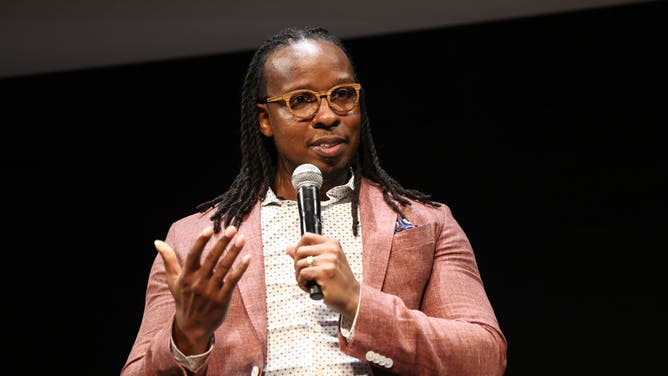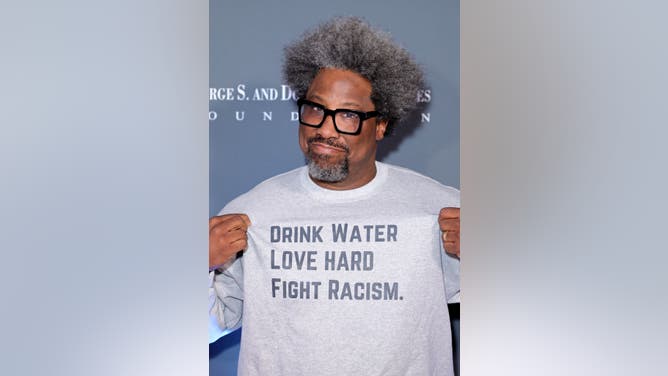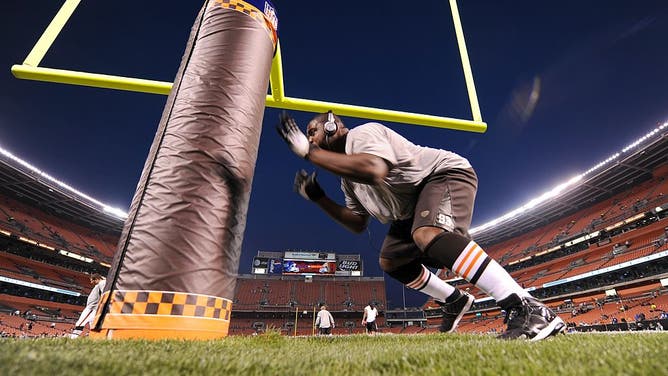ESPN, Ibram X. Kendi Documentary, Ostensibly About Sports, Labels America 'Structurally Racist Place'
Previously, OutKick did reviews of the first and second episodes of "Skin in the Game," a five-part docu-series produced by ESPN and starring Ibram X. Kendi (formerly known as Henry Rogers).
If you missed those, you can catch up here.
Additionally, if you were fortunate enough to not even know that ESPN partnered with race-hustler Ibram X. Kendi (a.k.a. Henry Rogers) for this project, you can read all about it here.
I'll wait for you to eagerly catch up on all the great content where ESPN tells you that you're inherently racist just for being an American.

Ibram X. Kendi partnered with ESPN to produce "Skin in the Game," a five-part docu-series that explains why sports are racist. (Photo by Tommaso Boddi/Getty Images for Netflix)
OK, now that all of that is out of the way, we can move on.
As I said in the review of episode one, I care deeply about the OutKick audience, so I watched the show. I know you don't want to do that -- and, frankly, I didn't either -- but at least I got paid to do it. Though, to be fair, not nearly enough.
With that, we move on to episode three...
"Highlights" from ESPN, Ibram Kendi's (a.k.a. Henry Rogers) third episode of "Skin in the Game"
Episode 3 title: "The Impossible Measure"
This episode focuses on something called "race norming," which I was only vaguely familiar with prior to watching this docu-series. It is defined as "the practice of adjusting test scores to account for the race or ethnicity of the test-taker."
The idea is that our society believes that black people are, on average, less intelligent than white people. The NFL used this in their defense of a CTE lawsuit, arguing that black players deserved less compensation than white players because they started with a lower cognitive function.
I'm certainly not going to defend the NFL here. In fact, what it did goes against everything I believe. Simply put: everyone should be held to the same standard. Most rational-thinking humans hold this belief.
That standard should apply in all aspects. See, that's the problem here. Kendi and his guests in this episode argue that black players should be held to the same cognitive standard as white players when it comes to payouts for health issues related to CTE from playing football. I agree.
But I bet they also believe in affirmative action. In fact, I'm certain that Kendi does.
Right, so Kendi argues that "race neutral" is a "fantasy." So, he wants the testing standard to be the same when it comes to the NFL paying head injury settlements. But he wants black students to be held to a lower standard when it comes to test scores for college admission. That's a bit hypocritical, isn't it?
For what it's worth, the NFL denies wrongdoing with regard to its testing former athletes for potential financial compensation from head injuries.
ESPN documentary "Skin in the Game" and host Ibram X. Kendi (a.k.a. Henry Rogers) don't "stick to sports" but rather label the entire country as racist
One of the actors in this episode is someone named W. Kamau Bell. In his biographical bar for the show, ESPN calls him a "comedian, host and author." I'll have to take their word for that.

ESPN documentary, produced by Ibram X. Kendi (a.k.a. Henry Rogers) features W. Kamau Bell, who declares America a racist country. (Photo by Michael Loccisano/Getty Images)
Bell says that he's not surprised the NFL uses "race-norming" since the league is in the United States. Thus, by definition, they are racist.
"I was reminded that the NFL exists in a place called America and America is a structurally racist place," Bell says.
Ah, here we go. We're no longer just talking about the NFL's practices anymore. No, this is an American problem.
Dang. I thought for a moment this was going to be about the NFL. No, we're right back to this horrible country called the United States.
The docu-series shifts quickly from Bell to Jemele Hill. Excellent.
Jemele Hill appears in ESPN documentary "Skin in the Game" with host Ibram X. Kendi (a.k.a. Henry Rogers) to deliver her usual schtick
"When you have this idea in sports that one group is inferior to another group ... it shows up in how we talk about sports," Hill says.
Hmm. Believing that one group is superior to another group is wrong when you believe that black people are inferior to white people. But it's perfectly fine when you believe that white people are inferior to black people, right Jemele?
Jemele Hill loves to generalize about white people but immediately screams "racism!" when the roles are reversed. Yet, ESPN happily puts her on camera and lets her lecture the public about the problems with racism. That's a bit hypocritical, isn't it?
The show moves on to former NFL player Louis Leonard. Leonard explains that the NFL, and football in general, didn't take concussions seriously until recently.
Yes, we know this information. We had euphemistic terms like "got your bell rung."
I'm white and I played sports. No one cared about my head more than anyone else's, regardless of skin color. That's just the way it was.

Louis Leonard of the Cleveland Browns goes through pre-game drills before a game against the New York Giants at Cleveland Stadium on October 13, 2008. (Photo by Rob Tringali/Sportschrome/Getty Images)
"Suck it up and get back in there," every coach to every player.
Now, we know about the risks associated with football. Yet, many people still choose the profession. Why? Because it comes with A LOT of perks. Money, fame, popularity. Many are willing to accept the consequences.
And that's America.
It's like smoking cigarettes. Every package explains that the product can give you lung cancer. But, you're free to choose to smoke. Freedom of choice, not freedom from consequence.
Episode 3 continues with more of the same...
The episode concludes the same way the others do: with a panel discussion about racism led by Ibram X. Kendi (a.k.a. Henry Rogers). This one features retired NFL players Michael Bennett and Ken Jenkins, and journalist Martenzie Johnson.
For the record, ESPN's press release refers to Johnson as "journalist," which is why I wrote it that way.
Johnson, though, produced a factually-inaccurate piece about racism in the NFL as it related to black quarterbacks.
Michael Bennett continues that thought process by saying that people still don't believe that black players can be quarterbacks. That's an interesting argument given that 13 of the current NFL starting quarterbacks are black and three black quarterbacks went in the top four of the most recent NFL Draft. Plus, several black quarterbacks are among the highest-paid players in the league.
There's nothing else particularly interesting about this panel, as they gather like-minded people to push the narrative that racism is the biggest problem in sports, in America and in the world.
I did find the very end of the episode quite interesting, though. Kendi explains that standardized tests are racist. How does he know that? Because he scored low on the SATs and went on to become a "doctor" -- in the same way Jill Biden is a “doctor” -- and receive the MacArthur "Genius Grant."
Kendi believes that his story proves his point about racism. I would argue that it flies directly in the face of it. He says that intelligence is subjective -- while patting himself of the back for being a genius, which is hilariously ironic -- and that America is racist.
Except, he is a black man who performed poorly on tests and went on to become a multi-millionaire in the United States. Sounds like a place that allows anyone to succeed, regardless of skin color, doesn't it?
There are still two episodes left, so perhaps they might invite someone on with a differing viewpoint to engage in a productive dialogue on the topic.
I'm not holding my breath.
But, hey, check back later for my reviews of episodes 4 and 5 of the series and see if I'm proven wrong!